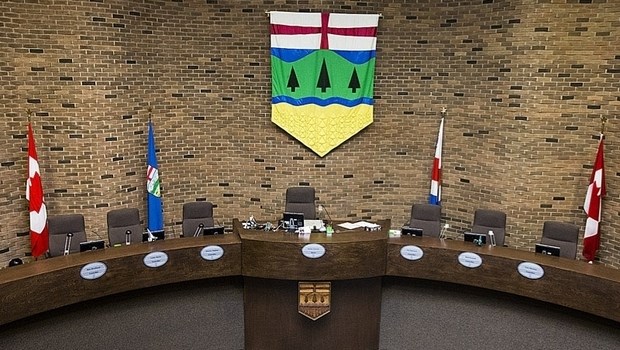At a fall 2024 Alberta Municipalities (ABmunis) convention, St. Albert will bring forward a resolution to allow electronic vote tabulators in municipal elections.
Each year ABmunis member municipalities vote on a series of resolutions to bring to the province for consideration. This year, St. Albert will advance four resolutions that will be debated by municipalities across the province at an annual meeting.
Mayor Cathy Heron added the resolution to request that the province continue to allow electronic tabulators. It comes after Alberta’s UCP government announced Bill 20, which would permit the provincial government to fire councillors, remove bylaws, introduce political parties to municipal elections in Calgary and Edmonton and ban the use of electronic vote tabulators in municipal elections.
Banning tabulators “makes no sense,” Heron told the Gazette. “There have been multiple lawsuits in the States proving these machines work, which sounds like a very American attitude of fear of voter fraud. It's coming from a small segment of our population, but the rest of the population should not have to pay for it.”
But when it came time for council to vote on whether St. Albert would advance the resolution, councillors Shelly Biermanski and Sheena Hughes did not side with Heron.
“I personally agree that it's fine if we had to do manual voting,” Hughes said during Tuesday’s council meeting. “I understand the convenience of [tabulators], but there are also other limitations that come with having these machines, and I understand why the provincial government decided to do what they did.”
Biermanski said there is a reason the province brought the legislation forward.
"Plus, it's a little bit premature when the bill hasn't passed yet,” Biermanski said at the council meeting.
Heron countered that hand counting is more likely to be flawed and could open the city up to recounts and judicial reviews. It would also delay election results and cost more.
After experiencing backlash, Minister of Municipal Affairs Rick McIver said last week that the province will amend Bill 20, but he did not mention whether it would reverse its position on tabulators.
Coun. Natalie Joly did not attend the meeting.
Watersheds, education property tax, mental health
Three other resolutions had the full support of council.
These included a resolution to offer preventative psychological supports to first responders such as paramedics, police and firefighters.
“One of the things we've started to see are those extended medical absences that are dealing with psychological injuries,” Coun. Ken MacKay said at the council meeting.
Providing early psychological support can help first responders remain resilient in the face of traumatic experiences, the resolution argues. The policy would reduce costs from stress-related leaves of absence.
Another resolution asks for assistance from the municipal affairs minister in finding ways for municipalities to keep more education property tax money. The education property tax is added to property taxes but collected by the province to support K-12 schools.
“[St. Albert collects] $38 million on behalf of the provincial government and sends it straight to them, but we only received under eight million back in infrastructure dollars,” Heron said. “When [the province] brought in education property taxes … the promise was that it would be equal … It's a promise I'd like to see kept.”
The final resolution asks for more provincial support managing the health of Alberta’s watersheds through “increased enforcement, data collection and information sharing with municipalities, and biodiversity assessments for municipalities located on smaller rivers and subwatersheds.”
“Any of the things that happen to the North Saskatchewan and, and Sturgeon as well, affect residents directly,” Coun. Mike Killick said. “We’ve seen extreme weather events over the last couple of years, much drier summers, lower water quality in the rivers.”
The issue affects all of Alberta, Killick said.
“We’re asking the government provincial government to work more closely with municipalities so that when they grant any water rights … the consult more closely with the local municipalities,” he said.
“You can't live without drinking water.”
The resolutions will be debated in at an ABmunis convention held in Red Deer in September.




